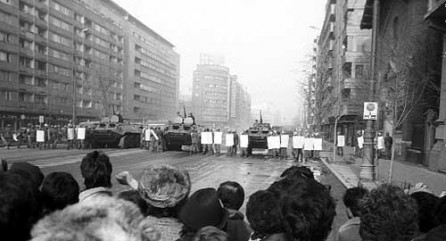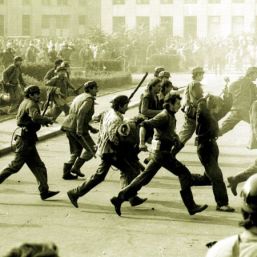
On the morning of December 21, 1989 I crossed through the center of Bucharest to visit a friend of mine at his office. Magheru Boulevard was crowded with workers on their way to the Palace Square, where Ceausescu was due to speak. They had drawn faces and were carrying their huge Ceausescu portraits silently. There weren't as many as usual because they had been ordered to attend at the last moment, and hadn't had time to prepare properly; a passerby told me this hurriedly, complaining.
By the time I was in my friend's office it was noon. He worked a few hundreds meters from the Palace Square, and from the window we could see a slice of Calea Victoriei, the street leading there. We couldn't see what was happening, being too far from the square, but we could hear the crowd. A radio in the office was broadcasting the speech - it was odd to hear the ovations when Ceausescu's cracked voice would pause, from the radio and the windows.
We didn't pay much attention, busy in conversation, when all of a sudden something seemed different. The chanting sounded chaotic and classical music started playing on the radio. We rushed to the open window and soon we could see people running for their lives down the street, dropping their placards.
From that moment it was bedlam. My friend and I rushed downstairs and took to the back streets but even those by now were filled with terrified people running over the shredded portraits of our leader.
Nobody could tell us what was going on, but we sensed this would somehow be a turning point in our lives. We ran into someone who said something about hearing a very loud, terrifying noise coming from an army car parked among the crowds, and he told us of people trying to run away being jabbed with sharp sticks by random civilians. It sounded like someone had provoked the whole thing, and it turned into a full-fledged riot.
We ran into a big crowd at the University Square and decided to join. By 5PM the crowd was huge, filling every inch of the place, and a police barricade went up at the Hotel Intercontinental. Police and army vehicles were amassed beyond that line.
We chanted "Down with Ceausescu" and watched the helicopters hovering incessantly above our heads. An armored army vehicle crossed slowly through the crowds towards the defense line, with a smiling, uniformed officer waving his hands, and so the crowds started to shout "the army is with us".
But the next vehicle, about an hour later, came at us at full speed. People started to run in panic, and then the police started to shoot at us. I ran - with everybody else - and hid between some bushes. Through my blurry, panicked vision I could see people lying bleeding on the street, but the crowds regrouped right away with more determination, and more rage.

We stayed until about midnight, constantly running and regrouping, occasionally making room for the dead and injured to be carried away. At midnight a full-force armed attack on the crowds compelled my friend and I to run, and we took to the dark streets towards our neighborhood.
The shooting went on all night and I listened to the machine-gun fire and explosions tucked under my covers, when I heard footsteps just outside my window. It sounded like a chase and I was terrified at the thought that somebody could break into my room and kill me to take up a strategic position. Instinctively I scrambled and hid under a massive desk I had positioned under the window, and I was there when the shots started. I don't know how long they lasted: my perceptions were completely altered from anything I had experienced until then.
When things quieted down and I came out from under my desk I saw the bed had been hit by many bullets, and my large, shuttered window was obliterated. I decided to leave immediately and go to my parents' house in their small southern town. I didn't know what was happening: if this was a revolution, if it was successful, or if a full reprisal was underway.
I had to get to the train station and the only option was to somehow cross the center.I tried to avoid the big avenues but eventually I had to cross Calea Victoriei and I found myself caught in the middle of an armed battle. Somebody guided me to cover behind a truck, where I found a few other people like myself pressed into each other.
A man wearing civilian clothes was firing a Kalashnikov right next to us, aiming up at a building. We were herded again to another position and we ran, jumping over pools of blood.
When I was finally out in the open I didn't dare stop running, as the shots came from everywhere. I made it to the train station to find people in a panic: rumors were flying that it was about to be bombed. I jumped on the first departing train going anywhere near the south, and it took me the whole day to get to my hometown.
Outside Bucharest things were as quiet and sleepy as ever. My family could hardly imagine what I had been through, and I had a feeling that I wasn't entirely believed.
The next day the television headquarters in Bucharest were occupied by revolutionaries and groups of them made live broadcasts, keeping us informed about developments. My family and I were glued to the screen. A new political organization had been created, The Front of National Salvation, and its three leaders proudly appeared together, surrounded by well-known artists and personalities.
That was the moment when I suddenly realized that everything was a big lie.
These three characters were Ion Iliescu, Petre Roman and Gelu Voican, and they claimed that they had never met before until this very morning in front of the television building, when they spontaneously decided to form the "Front".
I knew Gelu Voican very well, as well as his wife Sanda, since 1980; he was a very good friend at the time of an assistant professor at my university named Petre Roman and both of them had been talking since 1982 about a certain Ion Iliescu who they described as a great, charismatic person who one day was going to overthrow Ceausescu.
I turned to my father and I said: "They are liars, they're making this up!" He didn't believe me, eager to put his faith in real change, like everybody else.
Ceausescu was captured a few days later together with his wife, attempting to escape the country. They were summarily tried and executed on Christmas day on the orders of Gelu Volcan, the guy I used to know. It made me smile bitterly at the thought that I had socialized with a top guy in the Securitate for so long and had been fooled by his proclaimed reactionary views and his Fidel Castro look.
I wasn't the only one to understand the lie behind the events, and soon afterwards people started demonstrating at University Square again, this time against the "Front". People wanted the truth; they wanted to know who was responsible for all the killings. There were no answers.
Iliescu took compete control of the television and shamelessly promoted the "Front" for the first so-called democratic election scheduled, slandering the few leaders who had managed to organize minor opposition parties.
The demonstrators at the University grew in number, and people refused to leave; some installed tents and started hunger strikes. They proclaimed it a "communism-free zone".
I hung out there with many disillusioned young people like myself, feeling cheated by this cosmetic change that allowed the same regime to keep its power and make a mockery of our fight for genuine democracy. We chanted, speeches were made, and we hoped to get to the bottom of what was evidently a coup d'etat. Iliescu called us "golani" - meaning hooligans - and "agents in the pockets of foreign destabilizing interests".
Uninformed and lesser-educated Romanians were once again easily manipulated by the regime, this time wearing Iliescu's face. Iliescu called the miners from Valea Jiului to come to Bucharest to help him sweep clean the young democracy of the "golani", and they came in thousands, armed with shovels and sticks.

It occurred to me that this brilliant idea might have come from Gelu Voican himself, as he had worked all his life as an engineer at the Ministry of Mining and had long-term relationships with these people. In fact, during the eighties he often went on delegations to Valea Jiului.
The miners had instigators who guided them directly to the addresses of the opposition leaders and they showed no mercy. They also attacked anybody on the streets wearing jeans, or having long hair, clear signs of capitalist decadence. A pregnant girl I knew lost her baby after being beaten by the miners. I found myself dodging certain streets, afraid to run into anyone, as my style was by no means conventional. Things looked grim, and I was desperate to get out of there.
Compelled to show a semblance of democratic intentions, the regime had promised passports among other liberties, and there was a short window of opportunity when they issued them. I didn't miss my chance and I got a passport, and thanks to an Italian journalist and photographer I had helped who had come to cover the events, I was invited to Rome, where I would end up living for the next eight years.
Though the world today looks back at the events of December '89 in Romania as one in a series of revolutions throughout Eastern and Central Europe, we know that it wasn't; it was a shrewdly orchestrated coup d'etat from within, and the plotters maintained a tight grip on power, the security apparatus and the media for years to come, crippling the country's ability to genuinely progress, and adding insult to injury to an already wounded nation.